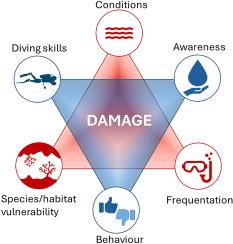走向蓝色潜水:分析和解决方案,以防止水肺潜水对地中海的影响
IF 5.4
2区 环境科学与生态学
Q1 OCEANOGRAPHY
引用次数: 0
摘要
休闲水肺潜水是地中海不断发展的旅游业,可以与公民科学倡议相结合,有助于收集广泛的数据,提高公众对海洋沿海生态系统的认识。然而,随着时间的推移,水肺潜水可能会对海洋群落的完整性构成威胁,主要是因为机械损伤可能会损害海洋生物的功能作用和美学价值。这项工作旨在为水肺潜水的适应性共同管理提供建议,重点是防止损害和培养地中海海洋环境中更负责任的行为。为了为设计的策略奠定坚实的基础,我们使用了三个工具:深入回顾文献,了解导致潜水员不负责任的态度和随之而来的环境破坏的因素;1 .已采用/建议的成功做法和导致未能实现对环境负责的行为的潜在因素;2 .利用空间指数法检测潜水撞击概率最高的区域;一个行为改变框架,以促进更大的环保意识和管理,并诱导思维转变的水肺潜水员。建议的管理流程围绕四个关键要素构建:1。建立一个由潜水中心和其他直接或间接与水肺潜水有关的利益相关者组成的网络;2. 发展数据中心,确保各方收集、储存和交换数据、知识和成果;3. 实施强有力的沟通计划,促进利益相关者网络内的多向反馈;和4。运用空间方法,绘制全港压力的分布和强度。在优先栖息地中,由于海洋洞穴的生态脆弱性和它们作为主要栖息地形成物种的避难所的潜在作用,至少在它们的入口处,需要决策者的特别关注。然后,小规模的成功管理案例可以与其他系统共享,以促进相互学习,为共同挑战提供众包解决方案,并通过数据和经验的阶梯式模型流逐步将方法扩展到更广泛的系统。本文章由计算机程序翻译,如有差异,请以英文原文为准。

Towards blue diving: analysis and solutions to prevent scuba diving impact in the Mediterranean sea
Recreational scuba diving is a growing tourism sector in the Mediterranean Sea that can be integrated with citizen science initiatives, contributing to the collection of extensive data and increasing public awareness of marine coastal ecosystems. However, over time, scuba diving can pose a threat to the integrity of marine communities, mainly due to mechanical damage that may compromise both the functional role and the aesthetic value of marine organisms.
This work aims to provide recommendations for adaptive co-management of scuba diving, with a focus on preventing damage and fostering more responsible behaviours in the Mediterranean marine environment. Three tools were used to lay a solid foundation for the designed strategy: 1. an in-depth review of the literature to understand the factors that contribute to the irresponsible attitude of divers and the consequent environmental damage; the successful practices that have been adopted/proposed and the potential factors that contribute to failures in achieving environmentally responsible behaviour, 2. a spatial index approach to detect the areas where the probability of diving impact is highest, and 3. a behavioural change framework to promote greater environmental awareness and stewardship and to induce a mindset shift in scuba divers.
The proposed management flow is built around four key elements: 1. the establishment of a network of dive centres and other stakeholders directly or indirectly connected to scuba diving; 2. the development of a data hub to ensure the collection, storage, and exchange of data, knowledge, and outcomes among all parties; 3. the implementation of a robust communication plan to facilitate multi-directional feedback within the stakeholder network; and 4. the application of a spatial approach to map the distribution and intensity of pressures across the territory. Among priority habitats, marine caves require particular attention from policymakers due to their ecological vulnerability and their potential role as refugia for key habitat-forming species, at least at their entrance. Successful management cases at small scale can then be shared with other systems to foster mutual learning, crowdsource solutions to common challenges, and progressively expand the approach to broader systems through a stepped, cascade model flow of data and experiences.
求助全文
通过发布文献求助,成功后即可免费获取论文全文。
去求助
来源期刊

Ocean & Coastal Management
环境科学-海洋学
CiteScore
8.50
自引率
15.20%
发文量
321
审稿时长
60 days
期刊介绍:
Ocean & Coastal Management is the leading international journal dedicated to the study of all aspects of ocean and coastal management from the global to local levels.
We publish rigorously peer-reviewed manuscripts from all disciplines, and inter-/trans-disciplinary and co-designed research, but all submissions must make clear the relevance to management and/or governance issues relevant to the sustainable development and conservation of oceans and coasts.
Comparative studies (from sub-national to trans-national cases, and other management / policy arenas) are encouraged, as are studies that critically assess current management practices and governance approaches. Submissions involving robust analysis, development of theory, and improvement of management practice are especially welcome.
 求助内容:
求助内容: 应助结果提醒方式:
应助结果提醒方式:


